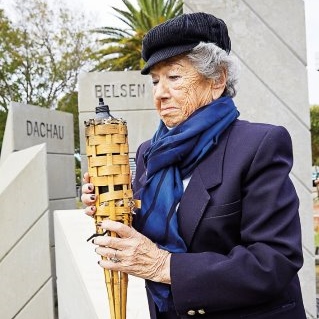
Featured Item

‘No place for hate’ a crucial message in a world gone mad
TALI FEINBERG
On an icy Cape Town morning at the Pinelands Jewish cemetery, every member of the audience was spellbound by her harrowing tale of survival, as she recalled the death march and the “snowy, blood-soaked, body-filled road”, where if you fell, you were shot. She says it was only the hand of G-d that helped her to keep walking.
She remembered how in Auschwitz, she asked her friend, “Who will survive this hell to tell the world? And if we survive, will the world believe us?” More than seventy years later, she has shared her story with schoolchildren, communities, professionals, and people from all walks of life in the hope that it will be heard in a world engulfed by hate.
This, too, was the message of Cape Board Chairperson Rael Kaimowitz. “Since the horrors of the Shoah, world leaders have proclaimed loudly that the ‘crime without a name’, as Winston Churchill referred to it, must never be allowed to happen again. But these are just empty words. How else do we explain a world gone mad as hate explodes all around us?” he asked.
“Although we know that there is a unique, horrific depth and scale to the Holocaust that is unprecedented, when you hear the names of Bosnia, Rwanda, Darfur, Syria, you know full well that the world has failed dismally. Not only failed to act, but essentially failed to give a damn,” he stated. “In the past six months, we have seen [the shootings in] Pittsburgh, Christchurch, Sri Lanka, and in Poway, California.
“As the world turned its back on the Jews in the 1930s, and again in those genocide massacres I mentioned, it is our job to shine a light into the darkness. As the second, third, and fourth generations after the Holocaust, we dare not turn our backs on the suffering of others,” he said.
“There is no place for anti-Semitism in the world today, but let’s also stand up and say there is no place for Islamophobia, or for the senseless murder of more than 300 Christian worshippers in Sri Lanka.
“There is no place for the baseless hatred of Jews. But let’s also stand up and say there is no place for hatred of the LGBTQI [lesbian, gay, bisexual, transgender] community, or for the Bahai or the Hindu community.
“Let’s not only pay lip service when we say ‘no place for hate’. Let’s call it out when we hear it, when we see it. Be it around our own Shabbat tables, in the staff canteen, on Clifton beach, or in the gym. Let’s take a personal stand. Let us commit to telling our parents and grandparents, our friends and our colleagues that hate in any form is just not acceptable.
Zola Shulman, the daughter of two Lithuanian survivors, performed a Yiddish song written by her uncle, poet and songwriter Leyb Rosenthal, in the Vilna Ghetto. Leyb died tragically in a labour camp two days before liberation.
Herzlia Head Student Zac Bagraim shared the fact that two thirds of American millennials do not recognise the word ‘Auschwitz’, and there has been an upsurge of hateful rhetoric around the world, as well as anti-Semitic graffiti, vandalism, arson, harassment, and murder. “This should never be accepted as normal, and that is the power of remembrance – which is our duty as members of this community,” he said.




